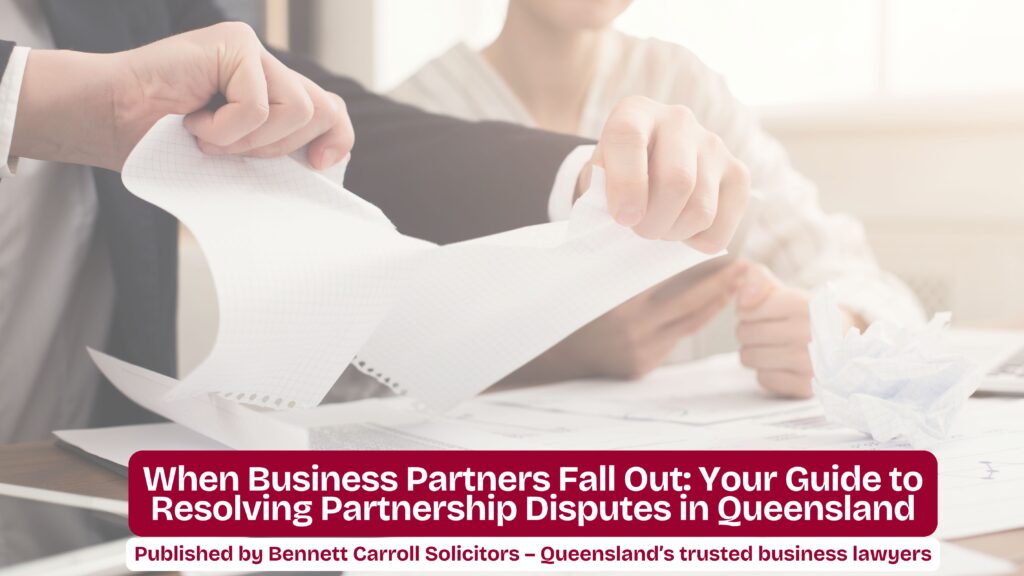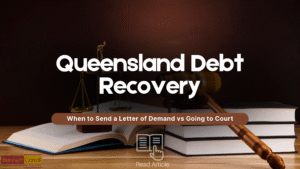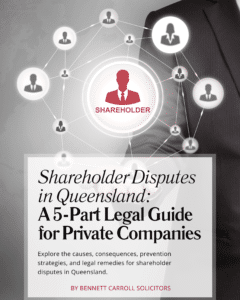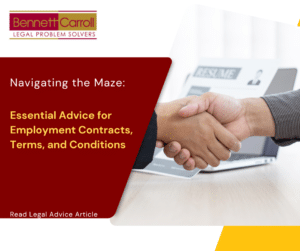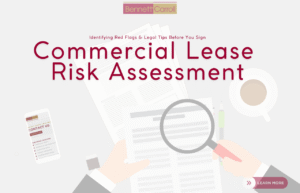Published by Bennett Carroll Solicitors – Queensland’s trusted business lawyers
Business partnerships often begin with optimism, shared goals, and mutual trust. However, when disagreements arise between partners, what started as a promising venture can quickly become a source of stress, financial loss, and legal complexity. If you’re facing a partnership dispute in Queensland, understanding your rights and options is crucial for protecting your interests and your business.
Common Causes of Partnership Disputes
Partnership disputes can emerge from various sources, often when partners’ expectations don’t align with reality. The most frequent issues we see at Bennett Carroll Solicitors include:
Financial disagreements are perhaps the most common trigger. Disputes over profit distribution, expense allocation, or financial contributions can strain even the strongest business relationships. When one partner feels they’re contributing more than their fair share – whether in time, money, or effort – resentment can build quickly.
Management and decision-making conflicts frequently arise when partners have different visions for the business direction. Without clear agreements about who makes which decisions, partners may find themselves at loggerheads over everything from hiring decisions to major business investments.
Breach of fiduciary duties occurs when one partner acts in their own interest rather than the partnership’s best interests. This might involve competing businesses, misusing partnership funds, or failing to disclose conflicts of interest.
Work allocation and performance issues can create tension when partners feel the workload isn’t fairly distributed or when one partner’s performance doesn’t meet expectations.
Understanding Queensland Partnership Law
In Queensland, partnership law is governed by common law and the Partnership Act 1891 (Qld). This legislation sets out the basic framework for how partnerships operate and can be dissolved, though many of its provisions can be overridden by a well-drafted partnership agreement.
Under Queensland law, partnerships are relatively easy to form – sometimes they can exist even without a formal agreement. However, this flexibility can become a disadvantage when disputes arise, as the absence of clear terms can make resolution more difficult and expensive. If you’re considering entering a partnership, our guide on Six Steps to Start Your Partnership provides essential information on establishing clear partnership foundations.
The Partnership Act 1891 (Qld) provides default rules for profit sharing, decision-making, and dissolution, but these may not suit your specific business needs. This is why having a comprehensive partnership agreement is so important – it can prevent many disputes from occurring in the first place. For more information about different business structures and whether a partnership is right for your situation, see our article on Business Structures in Queensland: Choosing the Right One for Your Startup.
Early Warning Signs Your Partnership May Be in Trouble
Recognising the warning signs of partnership problems early can help you address issues before they escalate into costly legal disputes:
- Communication between partners becomes strained or infrequent
- Partners start making unilateral decisions without consultation
- There’s disagreement about the business direction or major decisions
- Financial transparency decreases, with partners keeping separate books or accounts
- Work responsibilities become unclear or unevenly distributed
- Personal relationships between partners deteriorate
- Partners begin exploring other business opportunities independently
If you notice these warning signs, it’s worth seeking legal advice early. Often, problems that seem insurmountable can be resolved through skilled negotiation and clear communication, avoiding the need for costly litigation.
Your Options for Resolving Partnership Disputes
When partnership disputes arise, you have several resolution pathways available. The best approach depends on the nature of the dispute, the relationship between partners, and the urgency of the situation.
- Direct Negotiation
The first step should always be attempting to resolve the dispute through direct communication. Many partnership disputes stem from misunderstandings or different interpretations of agreements. A frank conversation, perhaps facilitated by your legal adviser, can sometimes resolve issues quickly and cost-effectively.
- Mediation
The Queensland Small Business Commissioner offers dispute resolution services to help small businesses resolve conflicts, including partnership disputes. The Queensland Small Business Commissioner (QSBC) is dedicated to supporting small businesses across Queensland and offers a range of services aimed at enhancing the business environment and reducing the time and costs involved in resolving disputes involving small business. Mediation involves a neutral third party helping partners communicate and reach a mutually acceptable solution. It’s typically faster and less expensive than court proceedings while allowing partners to maintain some control over the outcome.
- Expert Determination
For technical disputes (such as business valuations), expert determination can be effective. An independent expert with relevant expertise makes a binding decision on specific issues, providing certainty without the formality of court proceedings.
- Legal Proceedings
When other methods fail or urgent action is required, court proceedings may be necessary. The Queensland Civil and Administrative Tribunal (QCAT) or the Queensland courts can make orders about partnership dissolution, asset distribution, and other disputed matters. For more information about alternative dispute resolution processes available in Queensland, visit Business Queensland’s dispute resolution guide.
When Partnership Dissolution Becomes Necessary
Sometimes, despite best efforts, partnerships cannot be saved. The court may order dissolution of a partnership in cases where a partner has been declared of unsound mind, becomes permanently incapable of performing their duties, or in other specified circumstances.
Common grounds for dissolution include:
- Mutual agreement: Partners agree the partnership should end
- Expiration of term: If the partnership was formed for a specific period or purpose
- Notice by a partner: In partnerships of indefinite duration, partners can typically give notice to dissolve
- Death or bankruptcy: These events typically trigger automatic dissolution
- Court order: When disputes cannot be resolved and the partnership has become unworkable
The dissolution process involves winding up the partnership’s affairs, settling debts, and distributing remaining assets among partners according to their entitlements.
The Importance of Partnership Agreements
A well-drafted partnership agreement is your best defence against disputes. It should clearly outline each partner’s rights, responsibilities, and obligations, including:
- Capital contributions and profit-sharing arrangements
- Management responsibilities and decision-making processes
- Procedures for admitting new partners or a partner’s exit
- Dispute resolution mechanisms
- Valuation methods for partnership interests
- Restraint of trade and confidentiality provisions
Without a partnership agreement, you’re left to rely on the default provisions of the Partnership Act 1891 (Qld), which may not reflect your intentions or business needs. For detailed guidance on creating effective business contracts, including partnership agreements, see our article on Navigating Business Contracts: How a Contract Lawyer Can Safeguard Your Interests.
Protecting Your Interests During Partnership Disputes
If you’re involved in a partnership dispute, taking the right steps early can significantly impact the outcome:
Document everything: Keep detailed records of all communications, financial transactions, and business decisions. This documentation can be crucial evidence if the dispute escalates.
Seek legal advice promptly: Partnership law can be complex, and the stakes are often high. Early legal advice can help you understand your position and explore your options before problems worsen.
Consider the business impact: Prolonged disputes can damage your business relationships, affect staff morale, and impact customer confidence. Sometimes, a quick resolution – even if it involves some compromise – is better for the business overall.
Protect confidential information: Ensure that sensitive business information doesn’t fall into the wrong hands during the dispute process.
Maintain professional conduct: How you handle the dispute can affect your business reputation and future opportunities. Professional conduct throughout the process serves your long-term interests.
The Cost of Partnership Disputes
Partnership disputes can be expensive, both financially and emotionally. Legal costs can quickly escalate, particularly if the matter proceeds to court. Beyond legal fees, there are often other costs to consider:
- Lost business opportunities while partners focus on the dispute
- Damage to business relationships and reputation
- Stress and emotional toll on all parties involved
- Potential loss of key staff or customers
- Disruption to business operations
This is why early intervention and professional guidance are so valuable. Resolving disputes quickly and efficiently can save significant costs and preserve business relationships.
Planning Ahead: Estate Planning for Business Partners
Partnership disputes can become particularly complex when they involve the death or incapacity of a partner. Proper estate planning is crucial for business owners to ensure smooth succession and avoid disputes that could threaten the business’s survival. Our comprehensive guide on Estate Planning Essentials for Business Owners in Queensland: Wills, Testamentary Trusts and Succession Planning covers the important considerations for protecting your business interests and your family’s financial security.
Alternative Business Structures to Consider
If your partnership dispute reveals fundamental incompatibilities between partners, it might be time to consider whether a different business structure would better serve your needs. Some disputes stem from the inherent characteristics of partnerships, such as joint and several liability or the ease with which partnerships can be dissolved.
You might want to explore incorporating your business or establishing other structures that provide greater protection and clearer governance frameworks. Our guide on Navigating Business Structures: A Guide to Setting Up Your Business can help you understand your options.
If you’re operating as a company rather than a partnership, similar dispute resolution principles apply, though the legal framework differs. For guidance on shareholder disputes in private companies, see our comprehensive guide on Shareholder Disputes in Queensland: A 5-Part Legal Guide for Private Companies.
How We Can Help
At Bennett Carroll Solicitors, we understand that partnership disputes are rarely just about legal technicalities – they often involve personal relationships, financial security, and business dreams. Our experienced commercial lawyers work with Queensland businesses to:
- Prevent disputes through well-drafted partnership agreements
- Resolve conflicts using negotiation, mediation, and other alternative dispute resolution methods
- Protect your interests during partnership dissolution or restructuring
- Represent you in court proceedings when necessary
- Advise on business structures that might better suit your needs going forward
We take a practical, commercial approach to partnership disputes, always keeping your business objectives in mind. Our goal is to achieve the best possible outcome for you while minimising costs and disruption to your business.
Taking Action
If you’re experiencing partnership difficulties, don’t wait for the situation to deteriorate further. Early intervention can often prevent minor disagreements from becoming major disputes.
Partnership disputes require careful handling and expert legal guidance. The sooner you seek advice, the more options you’re likely to have for resolving the issue successfully.
Need help with a partnership dispute? Call us on 1300 334 566 or contact us here to arrange your consultation with one of our experienced commercial lawyers.

